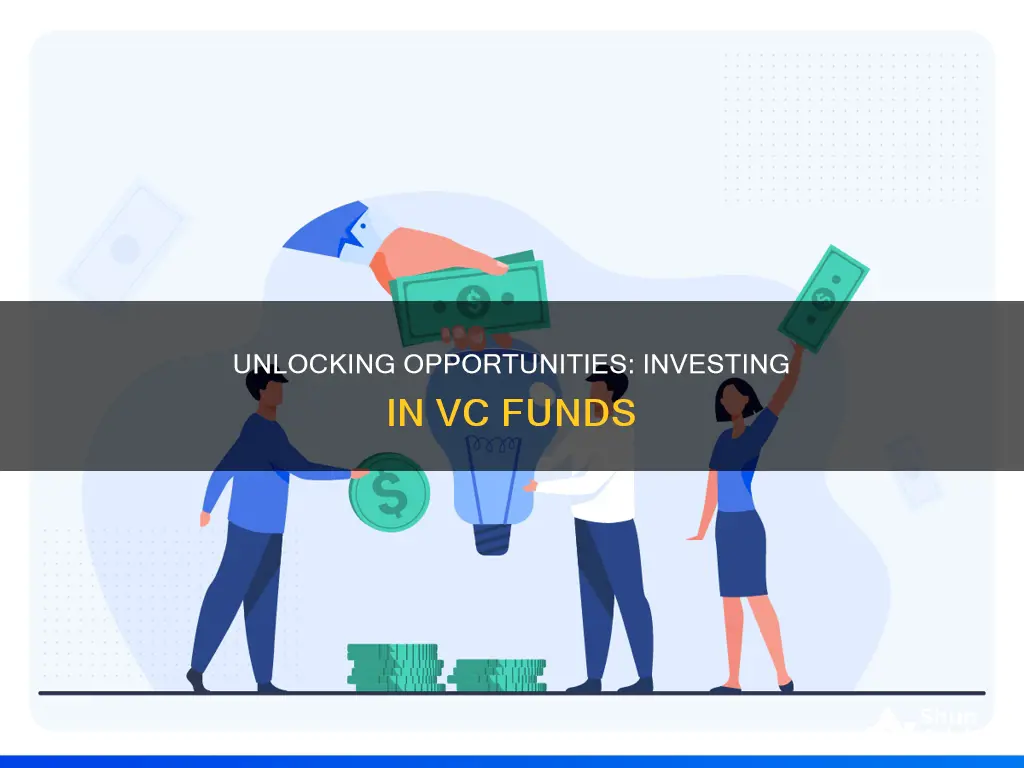
Allocating investment to venture capital (VC) funds is an appealing prospect for investors who want to back private companies in their early stages of growth, with the potential to become the next big thing. VC funds pool money from investors to finance these startups, which are often developing new products, trying new business models, or scaling their businesses to a larger audience.
VC funds are typically structured as limited partnerships, with a general partner (GP) managing the fund and limited partners (LPs) providing the capital as passive investors. The GP is responsible for making smart investment decisions, performing due diligence, and delivering returns to the LPs.
Investing in VC funds comes with certain risks, as the majority of startups will inevitably fail. However, the rewards for success are proportionately higher. VC funds tend to place modest amounts of capital in a large number of companies, spreading their investments across multiple startups within different industries to maximise their chances of landing on a successful company.
| Characteristics | Values |
|---|---|
| Investment rationale | Company's performance, market share, growth, moat, and potential exit value |
| Investment thesis | Supporting startups in a particular stage, industry, or geographic region |
| Capital allocation strategy | Establish parameters to guide the strategy |
| Investment size | Depends on the company's valuation, investment stage, expected return on investment, and growth potential |
| Risk-to-reward ratio | Higher risk-to-reward ratio increases the likelihood of rejection |
| Minimum acceptable diversification | N/A |
| Expected size of the first investment | N/A |
| Capital reserved for follow-on rounds | N/A |
| Target maximum fund allocation per company | N/A |
What You'll Learn

High-risk, high-reward investments
Venture capital funds are high-risk investments. Startups are inherently risky ventures, and many will inevitably fail. However, the potential rewards are also high. Venture capital funds are suited to this type of investment because they can offer both financing and expertise to early-stage companies.
The high-risk nature of VC funds is reflected in the investment strategy. Funds tend to place modest amounts of capital with a large number of companies, spreading the risk. This strategy also allows VC funds to build a diverse portfolio of companies with larger growth prospects.
The fund's size and risk-to-reward ratio determine the target sizes for their first and subsequent cheques. The size of the cheque varies according to the company's valuation, investment stage, expected return on investment, and growth potential.
VC funds are also characterised by a more active role in their investments. Fund managers work directly with entrepreneurs to optimise strategy, use capital efficiently, and go to market quickly. This active involvement can help startups grow rapidly and dominate their market.
The long-term nature of VC funds is another important factor in high-risk, high-reward investing. It can take years for startups to mature and grow in value. Fund managers need to balance early valuations with later knowledge, often increasing their position in later rounds as they gain a better understanding of the company's performance.
Overall, VC funds are a high-risk, high-reward investment strategy. The potential for large returns is counterbalanced by the significant risk of failure. Fund managers need to carefully consider their capital allocation strategy and actively manage their investments to maximise the chances of success.
International Company Funds: Where to Invest Your Money
You may want to see also

Active role in target investments
Venture capital fund managers take an active strategic role in their target companies, providing guidance and experience to the founders. They work directly with entrepreneurs to optimise strategy, use capital efficiently, and go to market quickly.
VC fund managers will often look to invest in a particular industry sector, business type, or geographic region where they can make the best use of the general partner's expertise and experience. They will also have a particular investment thesis, for example, supporting startups in a particular stage, industry, or region.
VC fund managers will also have a capital allocation strategy, which will be guided by several parameters. These parameters include the number of companies the fund will invest in, the expected size of the first investment into each company, how much capital to reserve for follow-on rounds, and the target maximum fund allocation per company.
The first investment cheque is usually based on the fund approach of having a holding of 10% or less. The fund's size and risk-to-reward ratio determine the target sizes for their first and subsequent cheques. The size of the cheque varies according to the company's valuation, investment stage, expected return on investment, and growth potential.
VC fund managers will also carry out due diligence, and, based on the outcome, decide whether to invest in the identified company. During this process, a SWOT analysis and, if necessary, a PESTLE analysis are performed in accordance with the VC fund's approach.
Smart Ways to Invest $1000 in Mutual Funds
You may want to see also

Long-term growth potential
Venture capital funds are a type of equity financing that enable entrepreneurial or small companies to raise funding before they have begun operations or started earning revenue or profits. They are designed to finance early-stage startup companies with high long-term growth potential.
Venture funds tend to focus on companies that are in need of capital to fuel their growth and development. They often look to invest in a particular industry sector, business type, or geographic region where there is substantial growth potential and where they can make the best use of the general partner's expertise and experience.
Venture funds are uniquely suited to offer both financing and expertise to companies where the risks are higher but the rewards for success are proportionately higher as well. They fill an important financing gap for higher-risk companies at early stages of growth, where public equity markets are unavailable and investments are too risky for banks.
Venture capital funds tend to make small investments for minority stakes in a relatively large portfolio of companies. They take an active strategic involvement in target companies, providing guidance and experience to the founders.
Venture capital funds generally have a longer holding period than other types of private equity funds, working towards IPOs or M&A transactions for their eventual exits. They are managed by general partners (GPs) who are responsible for making smart investment decisions and maximising returns for the investors.
Venture capital funds are structured under the assumption that fund managers will invest in new companies over a period of 2-3 years, deploy all (or nearly all) of the capital in a fund within 5 years, and return all capital to investors within 10 years. They tend to be large, ranging from several million to over $1 billion in a single fund, with the average fund size for 2015 coming in at $135 million.
The size of VC investments in a given startup can vary widely based on the particular investment theory and practices of each firm. The influx of VC cash, along with the additional resources, advice, and connections VCs can provide, often serves to help startups grow rapidly and dominate their market.
Venture capital funds have portfolio returns that tend to resemble a barbell approach to investing. Many of these funds make small bets on a wide variety of young startups, believing that at least one will achieve high growth and reward the fund with a comparatively large payout at the end. This allows the fund to mitigate the risk that some investments will fold.
Index Funds: How Much Should You Invest?
You may want to see also

Access to top startups
Venture capital (VC) funds are a great way to gain access to top startups. VC funds pool money from investors to finance early-stage startups with high long-term growth potential. This gives investors the opportunity to get in on the ground floor of companies that could become the next big thing.
Expertise and Connections
VC firms are managed by experienced fund managers who are experts at spotting promising startups and helping them succeed. They use their knowledge and connections to provide valuable resources, advice, and introductions to follow-on investors. This support can help startups grow rapidly and dominate their market.
Diversification
VC funds typically invest in a diverse range of startups across different industries, stages, and geographic regions. This diversification helps to maximise the chances of finding a successful startup while minimising the risk of failure.
High Returns
Historically, VC funds have outperformed public equity and other private investment categories. While investing in VC funds is risky, the potential rewards are high. Successful startups can generate returns that more than make up for any failed investments.
Access for Individual Investors
In the past, VC funds have been difficult for individual investors to access, as they typically cater to institutional investors. However, some platforms now offer accredited investors access to VC funds with lower minimum investment requirements. This makes it easier for individuals to get involved in VC investing and gain access to top startups.
Due Diligence
VC firms conduct extensive due diligence before investing in a startup. They evaluate the company's positioning, accounting needs, target market, product-market fit, and go-to-market strategy. They also consider the company's valuation, investment stage, expected return on investment, and growth potential. This due diligence helps ensure that VC funds are investing in the most promising startups.
Mutual Funds: Where to Invest for Maximum Returns
You may want to see also

Due diligence and analysis
Due diligence is a rigorous process used by investors to evaluate the business and legal aspects of a potential investment opportunity. It is an essential process that investors undertake to assess the viability and potential of early-stage startups, going beyond financial scrutiny to include legal, market, and operational examinations. Due diligence is a critical step as it allows investors to establish a startup's worth, align expectations, and unearth both risks and opportunities.
There are three stages of due diligence: screening, business, and legal. During the screening stage, venture funds review and evaluate hundreds of business opportunities, using predetermined criteria to identify which opportunities to focus on. Typically, for every 100 opportunities reviewed, 10 will receive a detailed review, and the fund may invest in one of them. The business stage involves a junior and senior member of the team investigating the viability of the deal, including reviewing the management team, market potential, product or service, and business model. The final legal stage involves a lawyer completing a legal review, and it is important to choose advisors that investors respect and use themselves.
The due diligence process offers benefits to both investors and startups, as it ultimately leads to a structured investment deal and can culminate in strategic alignment and partnership, propelling startup growth and investor success. Due diligence is a meticulous evaluation that is crucial for investment decision-making, and it helps to foster transparency and trust between investors and founders.
The due diligence process in venture capital involves assessing the investment opportunity, evaluating the management team, financial due diligence, legal and regulatory compliance, technology and intellectual property assessment, customer and partner references, synergy with the existing portfolio, and geographic and cultural factors.
Assessing the investment opportunity involves analyzing the company's business model, market potential, competitive landscape, and growth prospects to determine whether the investment aligns with the investor's objectives and strategy. Evaluating the management team includes assessing the team's experience, qualifications, and ability to execute the business plan, as a solid and capable management team is crucial for a startup's success.
Financial due diligence involves studying the company's financial statements, projections, and historical performance to assess the startup's economic viability, revenue model, burn rate, and capital requirements. Investors also look for potential issues in the financials, such as inconsistent or non-transparent reporting. Legal and regulatory due diligence is critical, as non-compliance or legal issues can affect the investment. This involves carefully examining contracts, licenses, intellectual property rights, and any legal disputes.
Technology and intellectual property assessment involves evaluating the uniqueness and protectability of the technology or intellectual property to ensure the startup has a defensible competitive advantage. Customer and partner references provide insights into the company's reputation, product quality, and stakeholder relationships.
Synergy with the existing portfolio refers to considering how the potential investment fits into the investor's existing portfolio and whether it complements their existing acquisitions. Finally, geographic and cultural factors may need to be considered, such as customer perception in the region and demographic structure.
TSP Funds: Where to Invest for Maximum Returns
You may want to see also
Frequently asked questions
VC funds offer access to early-stage, private companies that have the potential to become the next big thing.
Historically, VC funds have outperformed public equity, and other private investment categories.
VC funds pool money from investors and invest in startups with high long-term growth potential. They tend to focus on a particular industry sector, business type, or geographic region.
Investing in VC funds is high-risk. There is a high chance that the startup ventures will fail, and you may lose all your money.
VC funds make money through management fees, ManCo dividends and/or capital gains, and carried interest.







